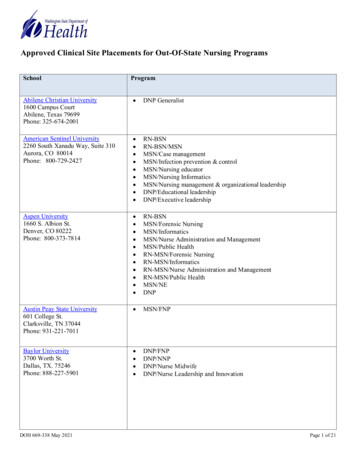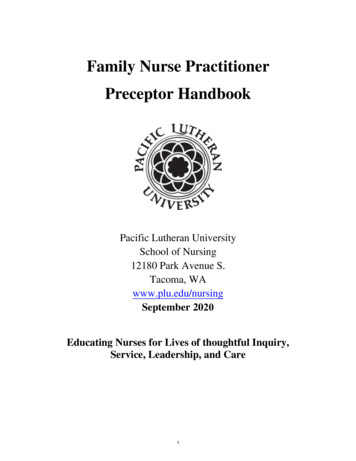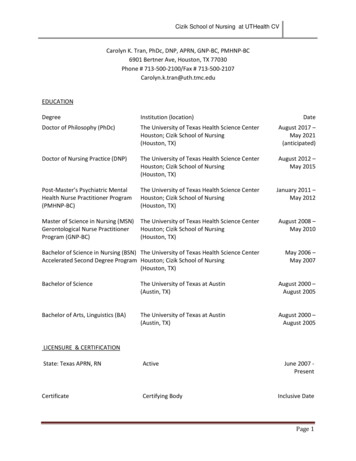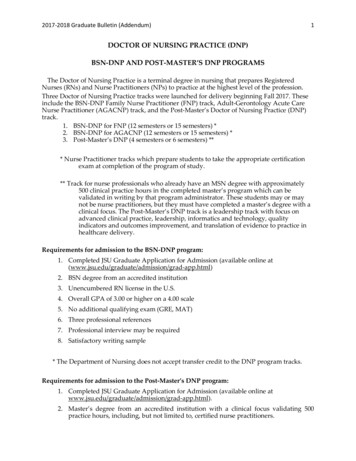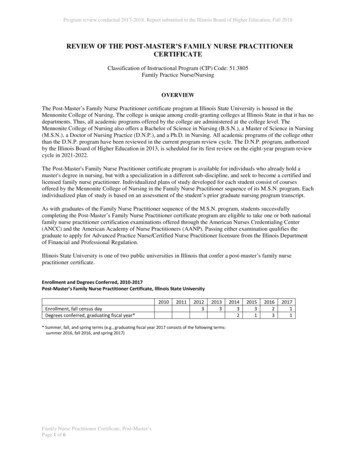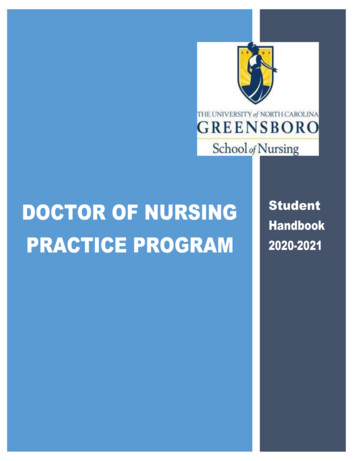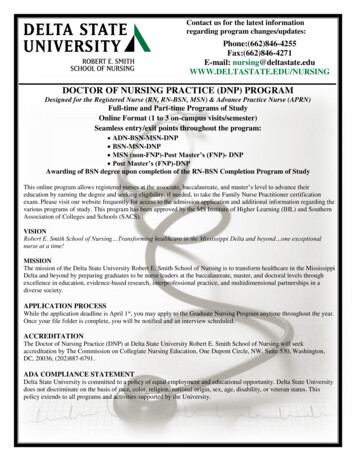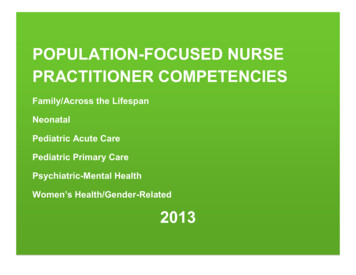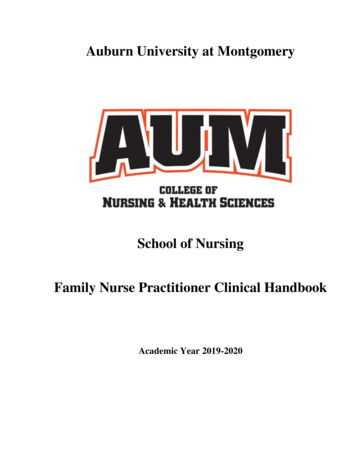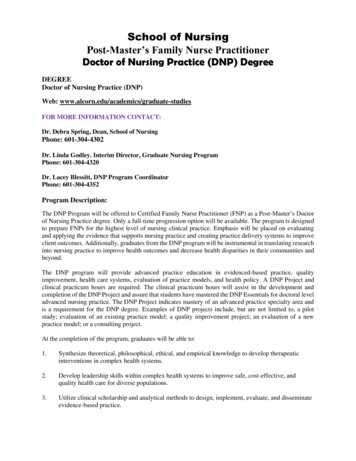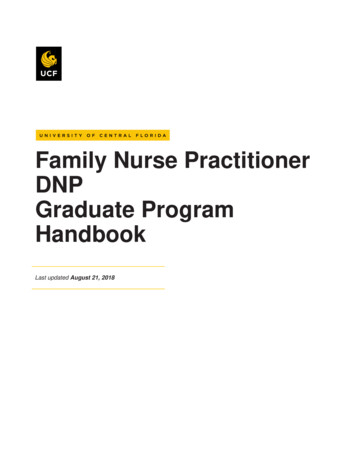
Transcription
Family Nurse PractitionerDNPGraduate ProgramHandbookLast updated August 21, 2018
Table of ContentsIntroduction .1Objectives .1Graduation Requirements for the DNP .2Independent Learning .2Curriculum .2Timeline for Completion .2Degree Plan of Study.2Progress to Degree .2Procedure for Proctoring of Major Examinations in Graduate Courses .3Independent Study.3Preceptored Clinical Practice .3DNP Clinical courses .5Dress Code for Nurse Practitioner Students .5Drug Screening Policy .6Expected Behaviors .6Social Networks .7Other .7Project DNP - (NGR 7911C, 7912C, 7913) .7DNP Advisory Committee Composition .7Role of the DNP Advisory Committee .8DNP Project Proposal .8DNP Project Proposal Review .9Protocol for Communication between Candidate and Chair regarding the DNP Project Prior to Graduation 10Final DNP Project Written Format . 10Final Oral Presentation of the DNP Project . 10Graduate Research . 11Financial Support . 11Financial Aid/Scholarships. 11Graduate Assistantships Positions . 12Graduate Teaching/Research Assistant Responsibilities. 12Traineeships . 14Website Resources . 14Graduate Student Associations . 14Scholarly Affiliations for Doctoral Students. 14Family Nurse Practitioner DNP Program Handbooki
Graduate Student Association . 14Professional Development . 14University Funding for Doctoral Student Presentations . 15Co-Authorship with Faculty . 15Instructional Strategies and Resources . 15Pathways to Success Workshops . 15Graduate Research Forum . 15Graduate Excellence Awards . 15Other . 16Job Search . 16Forms . 17Useful Links . 17Grad Faculty . 18Contact Info . 23Family Nurse Practitioner DNP Program Handbookii
Family Nurse Practitioner DNPTogether, the Graduate Student Handbook and your graduate program handbook should serve as your mainguide throughout your graduate career. The Graduate Student Handbook includes university information, policies,requirements and guidance for all graduate students. Your program handbook describes the details aboutgraduate study and requirements in your specific program. While both of these handbooks are wonderfulresources, know that you are always welcome to talk with faculty and staff in your program and in the GraduateCollege.The central activities and missions of a university rest upon the fundamental assumption that all members of theuniversity community conduct themselves in accordance with a strict adherence to academic and scholarlyintegrity. As a graduate student and member of the university community, you are expected to display the higheststandards of academic and personal integrity.Here are some resources to help you better understand your responsibilities: Academic HonestyAcademic Integrity Training - Open to all graduate students at no costPlagiarismIntroductionThe DNP Family Nurse Practitioner Track prepares nurses at the highest level of practice for the current healthcare environment based on a strong scientific foundation for practice; flexibility and emphasis on evidence-basedpractice, leadership, and organizational analysis; and analysis of the DNP project.ObjectivesThe objectives of the DNP program in nursing are to prepare graduates to: Critically analyze complex clinical situations and practice systems.Assume leadership roles in the development of clinical practice models, health policy and standardsof care.Demonstrate advanced diagnostic reasoning skills and clinical judgment through scholarship andnursing practiceAnalyze the social, economic, political, epidemiological and other scientific data to improve individual,aggregate and population health.Demonstrate information fluency and advanced communication skills to lead quality improvementinitiatives to improve patient care and health care systems.Design, implement, and evaluate comprehensive care to clients within an area of advanced practicespecialization.The College of Nursing will implement a student information database and repository, LEAP*RN. This databasewill house information regarding student course work, plans of study, clinical placements, clinical hours, logs, andall evaluation data. The database will assist us in maintaining standards required for CCNE accreditation, facilitatecourse planning and student progression, and enhance clinical tracking. Upon graduation, students will continueto have no-cost subscription access to their records, including their logged hours. The College of Nursing willcontinue to contact you through this system for follow-up employment surveys and to forward you informationpertaining to Alumni events and opportunities. All students will be responsible for an annual subscription rate ofless than 100, depending on the program. Subscription access will be payable directly to LEAP*RN at thefollowing link: secure.projectconcert.com/ucf. This URL will guide students through the payment process andFamily Nurse Practitioner DNP Program Handbook1
activates their account for use. Subscriptions must be up-to-date by the last day of the drop/add period eachsemester to avoid a “hold” service indicator being placed to prevent students from registration, enrollment, andother progression functions.Graduation Requirements for the DNP All course work completed (74 credits) with a minimum grade of "B"A satisfactory DNP ProjectClinical performance evaluated at a satisfactory levelA satisfactory public presentation of the DNP ProjectIndependent LearningA DNP Project will be completed by all students in the DNP program. A scholarly project, derived from clinicalpractice, will be developed in depth with faculty supervision.CurriculumPlease visit the Graduate Catalog to see the current curriculum for our program.Timeline for CompletionProgram completion will vary based on program track and enrollment status (full or part-time).Degree Plan of StudyA plan of study must be in each student's file. Students will be sent an initial plan of study with their admissionspacket. The faculty advisor will collaborate with each student prior to the start of their first term to review theirinitial plan of study to meet degree requirements. The initial plan of study is entered into the graduate programdatabase, which is used to plan course schedules. Any changes to the initial plan of study must be submitted tothe Office of Graduate Affairs. Plans of study are used to plan for resources, therefore students who change theirplans of study late in a semester may find courses in the following semester to be full.If students cannot follow the plan of study, students must contact the Office of Graduate Affairs to revise their planand may be required to submit a petition to the MSN-DNP APG Committee. This must be done prior toregistration. Students who enroll in a course not in their plan of study may be required to drop the course.PLEASE NOTE: Changes in plans of study may result in student delay in program completion because of coursescheduling. The College of Nursing strives to have the resources needed for faculty assignments. Therefore, anychange in students’ progression must be discussed with the advisor and the Office of Graduate Affairs. Plan ofstudy revisions must be verified with the Office of Graduate Affairs to determine if there is space available in thecourses.Progress to DegreeAll academic progression as well as admission and graduation decisions are made by the DNP Admission,Progression, and Graduation Committee (APG) of the College of Nursing and recommended to the AssociateDean for Graduate Affairs.A grade point average of 3.0 is required for continued study in the DNP program. Grades of below B or U are notacceptable in the DNP program. Students that receive a grade of below B or U in any course are subject toFamily Nurse Practitioner DNP Program Handbook2
dismissal from the program. Students will be given the right to petition to remain in the program, and a finaldecision on dismissal will be made by majority vote of the DNP APG Committee. If the student is allowed tocontinue in the program, any courses that have a grade of below B or U must be repeated with an earned gradeof “B”, S or better. In addition, anytime a student’s graduate status GPA falls below 2.0, they are automaticallydismissed from the program. Please refer to the Graduate Catalog for further information regarding the graduatestatus GPA.The College of Nursing uses a plus/minus grading scale as follows:A: 96-100A-: 92-95B : 87-91B: 83-86C : 79-82C: 75-78D: 70-74F: 69 or belowProcedure for Proctoring of Major Examinations in Graduate Courses All major examinations in graduate courses in the UCF College of Nursing will be proctored.Faculty will announce at the start of the semester If there are major examinations in the course If there will be proctored testing available at the CON or on campus Dates and times for proctored exams The test will be available during a fixed time period during the scheduled class time forsections of classes that are web-mediated classes. The test will be available for no longer than 12 hours for sections of classes that are fullyweb-based.An online test proctoring service will be used for major course examinations if a CON or on-campustesting option is not used. Proctored examinations are limited to no more than three per course.Students are responsible for setting up an account, scheduling the examination, having requiredtechnology and paying any associated costs (instructions will be provided within webcourses). Thecurrent cost per examination is 25.Current courses that use ProctorU testing are: NGR 5141, NGR 5003, NGR 6172, NGR 6201, NGR6263, NGR 6305, NGR 6334.Independent StudyStudents who wish to do an independent study must meet with the instructor and complete the College ofNursing Special Registration Form: Course Request for Independent Study, Doctoral Research, DNP Project,Residency or Dissertation. This must be submitted to the Office of Graduate Affairs to create the independentstudy in the schedule. As soon as the course is in the schedule, the student will receive registrationinstructions. Students may have no more than 6 hours of independent study in a master’s plan of study or 12hours in doctoral plan of study.Preceptored Clinical PracticeGuidelinesNursing is a practice discipline. To learn the skills of a teacher, nurse practitioner, clinical nurse leader, clinicalnurse specialist, or nurse leader and manager the student must practice with an experienced clinician. This isFamily Nurse Practitioner DNP Program Handbook3
achieved by preceptored clinical assignments. Preceptored clinical assignments offer a unique opportunity forstudents to observe and practice in the specialized role that is the focus on their master’s program track at UCF.Student documents must be current in order to participate in any clinical practice learning experience that involvespatients. The following items are required upon admission into the program in order to participate in any clinical: Completed LiveScan FingerprintsCompleted Drug TestCompleted Background CheckCopy of current BLCS certification card (course C for healthcare providersCollege of Nursing Health FormProof of HIPAA TrainingCurrent Florida RN LicenseProof of health insuranceAll of the items above require an account with Castle Branch for a fee of 170.00.Student documents must be current in order to participate in any clinical practice learning experience that involvespatients (e.g. RN license, health clearance, etc). Students who do not have the FBI/FDLE and theCertifiedBackground.com clearance may not be able to complete the program and graduate. Students mustsubmit the required health form to the Graduate Program Assistant no later than the end of their first semester ofstudy. Drug screening is required for all sites. Cost of these may be the responsibility of the student. Some sitesrequire formal orientation to the site and/ or their electronic medical record system.A clinical placement orientation session is included the new student orientation and repeated at the start of thestudents’ first clinical course. Students who do not attend these sessions remain responsible for obtaining thecontent reviewed there.When required, all NP students must submit the required preceptor planning information to the Graduate ClinicalCoordinator, no later than midterm of the semester prior to each semester in which they will be in a clinicalpractice course. The exact deadline date will be announced in the first weeks of the semester. Students who failto meet this deadline will not be allowed to register for clinical in the following semester and will need to contactthe Graduate Nursing Office to revise their plan of study.Clinical placements for Post BSN DNP students receiving initial preparation as advanced practice nurses will bein the greater Central Florida area. This includes Orange, Seminole, Volusia, Lake, Brevard, Osceola, Flagler,Northern Indian River, and Marion counties. Placements in other locations are at the discretion of the faculty andare dependent on availability of Clinical Instructors to make site visits.Nurse Practitioner students in the Family Nurse Practitioner or Adult-Gerontology Primary Care Nurse Practitionerprogram are preparing for primary care roles and cannot make hospital rounds, go to surgery, procedures, or carefor a hospitalized client. Such activities are considered personal arrangements and are not associated with UCF.Thus NP students cannot do physicals, histories, document, write prescriptions or engage any other activities theywould usually be able to do if seeing the patient as part of a UCF clinical course if they are performing theseactivities in an acute care setting. Students doing such observations are not covered under CON liabilityinsurance and the hours will not count towards required faculty supervised clinical hour requirements for anycourse.NP students must do one half of total clinical hours up to and including Practicum (NGR 6248) with a NP or CNMpreceptor. For FNP track students this is 360 hours. For Adult/Gerontology Primary Care NP students this is 330hours. For Adult/Gerontology Acute Care NP students this is 330.Preceptors for the remaining 360 or 330 hours may be a NP, CNM, MD or DO. A physician assistant (PA) cannotbe the preceptor of record. Students in primary care programs must complete all rotations at primary care sitesFamily Nurse Practitioner DNP Program Handbook4
except in the final clinical practicum. FNP students can complete up to 50% and AGPCNP students can completeup to 100% of their required practicum clinical hours in the ED, urgent care, retail health care, or in an officesetting.All clinical courses, including the final clinical practicum, are to occur at a single clinical site with a singlepreceptor. Limited exceptions are made for work with preceptors who work at multiple locations for the samepractice or to work with two preceptors at the same practice site and are at the discretion of theClinical Placement Coordinator. The final clinical practicum, can occur at one site only.Throughout each clinical course, NP students will be required to complete: Clinical Activities Log – This will be completed using the Typhon Clinical Tracking System. Thissystem allows the student to document all hours completed at each clinical practice with eachpreceptor. Documentation of data from all client interactions during each NP student’s clinical practicelearning experience are also recorded.Student Preceptor/Site Evaluation – Each student will submit an evaluation of the preceptor andthe site in which the student completed their clinical learning experience.Midterm Preceptor Evaluation of Student - Each student will submit an evaluation by theirpreceptor of record after completing ½ of the required clinical hours for a clinical course. If the studenthas more than one preceptor, a midterm evaluation must be obtained and submitted from eachpreceptor.Final Preceptor Evaluation of Student - Each student will submit a final evaluation by theirpreceptor of record after completing the required clinical hours for a clinical course. If the student hasmore than one preceptor, a final evaluation must be obtained and submitted from each preceptor.DNP Clinical coursesDNP placements will be individualized and negotiated with the faculty advisor or DNP Program Coordinator orClinical Placement Coordinator. Documents for evaluation of the experience will include at least: Clinical Activities Log - Documents all hours completed at each clinical practice with each preceptor.Clinical Summary Spreadsheet – individualized to document activities in the clinical site that supportthe individual goals of the student experiencePreceptor/Site Evaluation - Documentation of student’s comments related to various aspects of thepreceptor and the site in which the student completed their clinical learning experience. In addition, allNP students will be evaluated by a standard set of criteria from their clinical instructor and eachpreceptor.Preceptor evaluation of student.Dress Code for Nurse Practitioner Students All students must be dressed professionally when in clinical settings, whether on or off-campus. Thisincludes both labs and preceptor sites as well as professional meetings.The UCF College of Nursing photo identification stating nurse practitioner student must be wornduring all clinical activities.A clean, wrinkle-free official UCF white lab coat with the College of Nursing logo must be worn at allclinical functions whether on campus or in clinical settings.Business attire must be worn under lab coats; scrub suits are allowed in acute care settings only.Students must also comply with dress code policies of the clinical sites where they are beingprecepted.Nails must be trimmed; artificial nails and nail polish are not permitted.Family Nurse Practitioner DNP Program Handbook5
One pair of stud-type earrings (one earring per ear lobe only and no larger than than ¼” in diameter)may be worn; no gauge-type earrings. No other visible piercings, including clear piercings areallowed, including tongue and nasal piercings.One plain wedding band may be worn; one wristwatch with a second hand is required.Visible tattoos must be covered.Make-up, if used, must be discrete.Hair must professionally appropriate; appropriately secured away from face and patient contact; of anaturally occurring color.Facial hair for men must be clean and neatly trimmed. (Some agencies do not allow personnel,including students, to wear any facial hair.)Perfumes, colognes, after-shave or scented fabric soaps/softeners should not be worn.Chewing gum during clinical and on-campus labs is not permitted.Smoking of any kind is not acceptable when in clinical settings. In addition, clothing and hair thatretain smoke odors are not acceptable in clinical settings.Drug Screening PolicyAll incoming students in the University of Central Florida College of Nursing shall undergo a 14 panel drugscreening prior to the start of nursing clinical experiences.All students must agree, at the time of admission into the program, to be drug screened on demand at any timeduring the program. A negative drug screen completed at an approved lab which can directly report results to theCollege of Nursing, which was completed not more than 3 months prior to admission to the College of Nursing,will also be accepted. Students are responsible for the cost of all drug screenings.Evidence of substance abuse may result in disciplinary action up to and including administrative withdrawal fromcourses and dismissal from the program. Information about drug screenings process will be conveyed to studentsat the time they are approved for admission into the nursing program. The College of Nursing will have access tothe results of the drug screenings and these results may be shared with the clinical sites at which the student isplaced.Expected BehaviorsStudents are expected to exhibit behaviors consistent with safe practice as nursing professionals under thedirection of the faculty member and/or preceptor. The student must have a satisfactory performance in eachclinical behavior by the last clinical day or the student will receive an unsatisfactory grade in the course. Alldocumentation must be accurate, reflecting care rendered.Students must notify their instructor and the clinical agency if they will be absent or late. Failure to do this mayresult in an unsatisfactory grade in a clinical course.Disciplinary action, including clinical failure and possible dismissal from the program, will be taken for studentswhose behavior is unacceptable. Examples of unacceptable behaviors include, but are not limited to the followingactions: Provide nursing care in an unsafe or harmful manner. For example: To perform a procedure without competence, or without the guidance of a qualified person. To willfully or intentionally do physical and/or mental harm to a client. To exhibit careless or negligent behavior in connection with care of a client. To refuse to assume the assigned and necessary care of a client, and to fail to inform theinstructor with immediacy so that an alternative measure for that care can be found.Family Nurse Practitioner DNP Program Handbook6
Disrespect the privacy of a client (breach of confidentiality). For example: To use the full name or position of a client in written assignments, and/or patient data of any sort,e.g. computer-generated forms retrieved from the clinical area. (All identifying information mustbe obliterated from documents). To discuss confidential information in inappropriate areas including social networking or otheronline sites. To discuss confidential information about a patient with third parties who do not have a clear needto know. To remove any record or report (or copy) from the area where it is kept, except in theperformance of student nurse assignments. To violate HIPAA and/or FERPA guidelines (as appropriate to setting).Falsify patient records or fabricate patient experiences.Fail to report omission of, or error in, assessments, treatments or medications.Use, possess, sell, or distribute illicit drugs; to illegally use, sell, possess, or distribute any drugs oralcohol; or to use prescribed, over the counter, or illicit substances in such a manner as to impairone’s judgment or performance as a nursing student.Social NetworksProfessional conduct extends to all forms social networks, including Facebook, MySpace, YouTube, texting, emailing, photographing, videotaping and any other means of communication. Students must follow HIPAAguidelines when dealing with information about clients and patients. Students must also follow privacy laws whenexposed to information about other students, faculty, staff, and others they meet during their time at the College ofNursing. Information regarding students and others may not be saved or broadcast in any form without writtenrelease by the individuals involved and the agencies identified. Permission prior to recording or taping must beobtained and filed with the Office of Graduate Affairs. Failure to follow these rules, may result in administrativeaction, including dismissal from the College of Nursing. Disrespectful behavior by students towards otherstudents, faculty, staff, patients, clients, agencies, etc. will not be tolerated.OtherTo obtain a Post-Master's DNP sample course schedule for both full-time and part-time enrollment, please visitthe College of Nursing website. DNP Post-baccalaureate track students follow a different sample plan.Project DNP - (NGR 7911C, 7912C, 7913)The DNP Project is a multi-semester project that reflects the culmination of practice inquiry, knowledge, andcompetencies. The DNP Project entails student engagement in partnership building with inter-professionalcolleagues, consumers, and /or faculty to examine a clinical question or issue that involves translating evidence toeveryday practic
Family Nurse Practitioner DNP Program Handbook 1 Family Nurse Practitioner DNP Together, the Graduate Student Handbook and your graduate program handbook should serve as your main guide throughout your graduate career. The Graduate Student Handbook includes university information, polic
